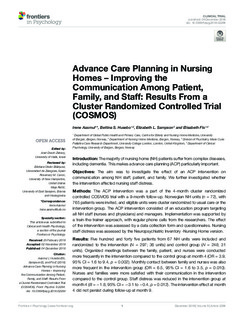| dc.contributor.author | Aasmul, Irene | |
| dc.contributor.author | Husebo, Bettina S. | |
| dc.contributor.author | Sampson, Elizabeth L. | |
| dc.contributor.author | Flo, Elisabeth | |
| dc.date.accessioned | 2020-01-27T09:48:37Z | |
| dc.date.available | 2020-01-27T09:48:37Z | |
| dc.date.issued | 2018 | |
| dc.identifier.citation | Aasmul, I. et al. (2018): Advanced Care Planning in Nursing Homes - Improving the Communication Among Patient, Family, and Staff: Result From a Cluster Randomized Controlled Trial (COSMOS), Frontiers in Psychology 9:2284. | nb_NO |
| dc.identifier.uri | http://hdl.handle.net/11250/2637997 | |
| dc.description.abstract | Introduction: The majority of nursing home (NH) patients suffer from complex diseases, including dementia. This makes advance care planning (ACP) particularly important.
Objectives: The aim was to investigate the effect of an ACP intervention on communication among NH staff, patient, and family. We further investigated whether the intervention affected nursing staff distress.
Methods: The ACP intervention was a part of the 4-month cluster randomized controlled COSMOS trial with a 9-month follow-up. Norwegian NH units (n = 72), with 765 patients were invited, and eligible units were cluster randomized to usual care or the intervention group. The ACP intervention consisted of an education program targeting all NH staff (nurses and physicians) and managers. Implementation was supported by a train-the-trainer approach, with regular phone calls from the researchers. The effect of the intervention was assessed by a data collection form and questionnaires. Nursing staff distress was assessed by the Neuropsychiatric Inventory -Nursing Home version.
Results: Five hundred and forty five patients from 67 NH units were included and randomized to the intervention (N = 297; 36 units) and control group (N = 248; 31 units). Organized meetings between the family, patient, and nurses were conducted more frequently in the intervention compared to the control group at month 4 (OR = 3.9, 95% CI = 1.6 to 9.4, p = 0.002). Monthly contact between family and nurses was also more frequent in the intervention group (OR = 6.5, 95% CI = 1.6 to 3.5, p = 0.010). Nurses and families were more satisfied with their communication in the intervention compared to the control group. Staff distress was reduced in the intervention group at month 4 (B = -1.8, 95% CI = -3.1 to -0.4, p = 0.012). The intervention effect at month 4 did not persist during follow-up at month 9.
Conclusion: Compared to control, the ACP intervention improved the communication, and family and staff satisfaction as well as reduced staff distress. However, during the follow-up period these positive effects were not persistent. Indicating the necessity for ongoing staff support regarding ACP. | nb_NO |
| dc.publisher | Frontiers in Psychology | nb_NO |
| dc.rights | Navngivelse 4.0 Internasjonal | * |
| dc.rights.uri | http://creativecommons.org/licenses/by/4.0/deed.no | * |
| dc.subject | advance care planning | nb_NO |
| dc.subject | dementia | nb_NO |
| dc.subject | nursing home | nb_NO |
| dc.subject | train-the-trainer | nb_NO |
| dc.subject | staff distress | nb_NO |
| dc.subject | COSMOS | nb_NO |
| dc.subject | palliasjon | nb_NO |
| dc.subject | palliativ omsorg | nb_NO |
| dc.title | Advance Care Planning in Nursing Homes – Improving the Communication Among Patient, Family, and Staff: Results From a Cluster Randomized Controlled Trial (COSMOS) | nb_NO |
| dc.type | Journal article | nb_NO |
| dc.source.volume | 9 | nb_NO |
| dc.source.journal | Frontiers in Psychology | nb_NO |
| dc.source.issue | 2284 | nb_NO |
| dc.identifier.doi | https://doi.org/10.3389/fpsyg.2018.02284 | |

